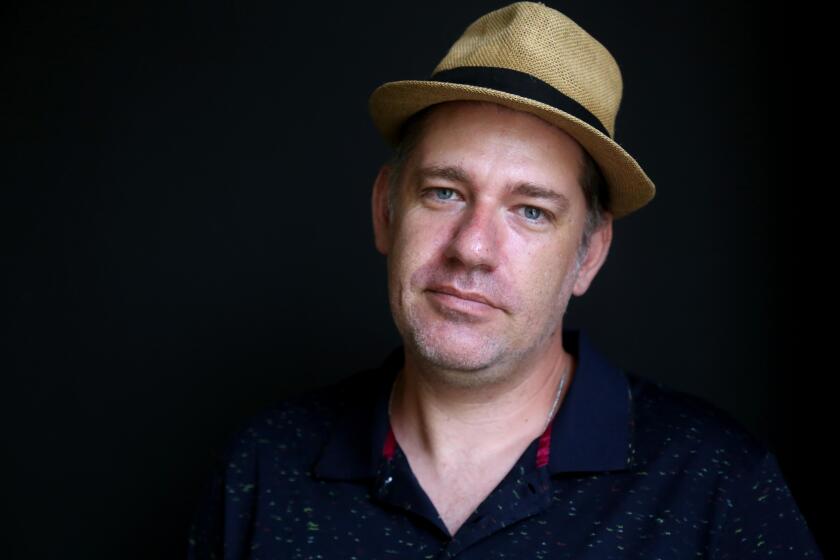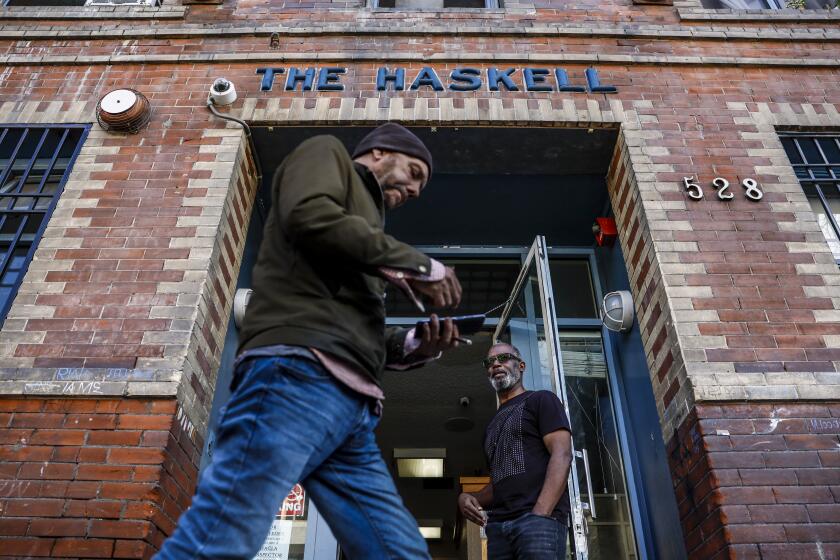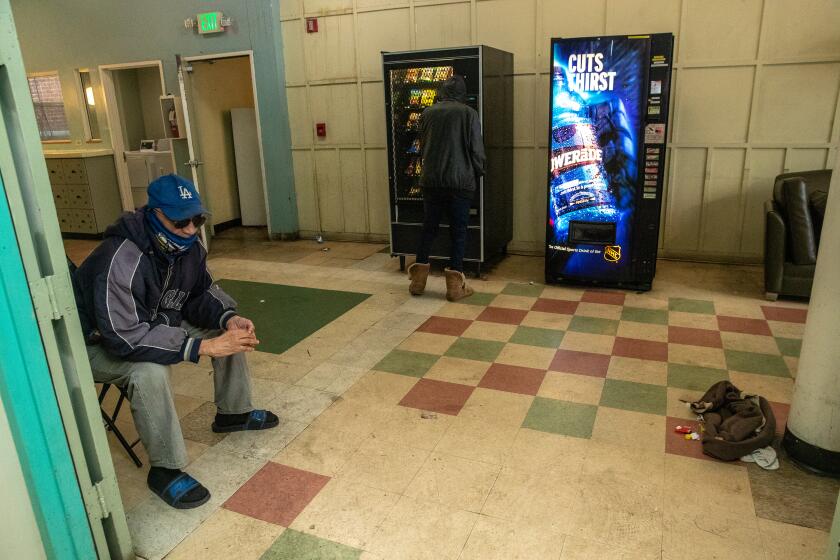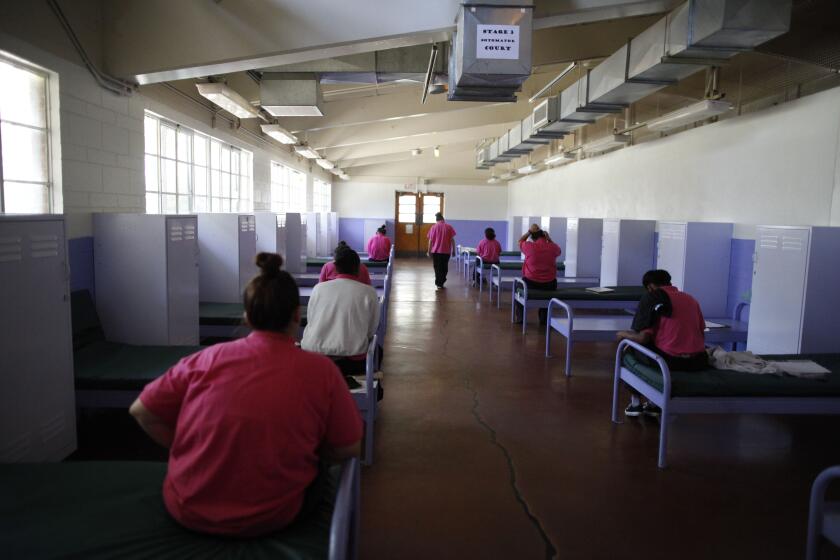New owner cuts security, janitors at Skid Row homeless housing as tenants fear worsening conditions

- Share via
- The new owner of one of Los Angeles’ largest homeless housing portfolios has reduced security and janitorial services. Tenants say the buildings have deteriorated.
- The owner says the costs were unsustainable and he’s investing in more permanent solutions. The city of Los Angeles had allocated almost $40 million to maintain the portfolio while in receivership.
As days went by and dirt, dog waste and grime piled up in the Produce Hotel in Skid Row, Jermaine Staley broke into the janitorial closet. The 78-year-old tenant spent four hours over an afternoon last week sweeping staircases and common areas and he was finishing by mopping the lobby. Sweat glistened on his head and pooled on his undershirt.
“They ain’t got no soap,” said Staley, who has lived in the building for 27 years. “I had to use my own soap.”
Staley and other tenants said the Produce had deteriorated over the previous two weeks since the building had been sold out of receivership to Beverly Hills developer Leo Pustilnikov. Upon taking control of the Produce and 16 other supportive housing buildings he acquired in a $10-million deal, Pustilnikov sharply curtailed janitorial and security services.
Tenants in multiple buildings said their incoming landlord’s changes have led to filthy shared bathrooms, constant trespassers and growing fears of violence. Fuschia Hayes, a resident of the Senator Hotel since 2020, said the reduced security has allowed drug dealers to cycle in and out and squatters to fill empty rooms.
“The building’s just nastier now,” said Hayes, 30.
After a failed bid downtown a decade ago, developer Leo Pustilnikov is on the verge of a massive real estate deal in Skid Row, adding to his large portfolio across Southern California.
The rapid diminishment in quality of life described by residents represents another setback in city leaders’ attempts to provide long-term stability to one of the region’s largest portfolios of homeless housing.
Eighteen months ago, with nonprofit owner Skid Row Housing Trust on the verge of collapse, Mayor Karen Bass and other city leaders pushed the buildings into receivership. The sale of 17 former trust properties to Pustilnikov this fall was supposed to end the saga.
Bass said she was “absolutely” concerned about service cuts in the buildings.
“We want to make sure that in all of the housing people are safe, they’re cared for, they’re getting the services that they need,” Bass said at a news conference in Skid Row last week.
Pustilnikov said the level of third-party security and maintenance services he inherited at the buildings — 24/7 armed security with two guards on duty overnight and daily janitorial shifts at many buildings — was financially unsustainable, costing more by itself than buildings’ annual rent revenues. Security coverage, he said, now consists of night shifts during the week and additional shifts on the weekend.
Pustilnikov said he’s planning to spend millions to install cameras and expand trash rooms to more efficiently handle the issues.
“Instead of simply wasting money to create the appearance of safety, we are investing real money into creating a sustainable, safe and clean environment for tenants,” Pustilnikov said.

Many tenants in the buildings are elderly, disabled, mentally ill or addicted to drugs. The makeup of the residents is a result of the region’s system for prioritizing the most vulnerable and troubled people for permanent housing. Pustilnikov said his top priority is ensuring tenants receive the social services they’re entitled to, which he said will do more to improve conditions than anything else.
“The best way to increase resident safety is to make sure that everyone receives the services they need,” he said.
Following years of revolving leadership and a broken financial model for operating single-room occupancy hotels, the trust announced its impending failure in early 2023. At the time, the trust owned 29 buildings in and around Skid Row with a total of 2,000 units, though a quarter of them had been deemed uninhabitable.
For more than 100 years, single-room occupancy hotels have housed thousands of people in Skid Row. Now, L.A. leaders are saying their time has passed. Some fear losing them will displace their formerly homeless residents.
Fearing what they called a humanitarian crisis, the city agreed to pay nearly $40 million to finance the receivership, during which more than 800 city code and habitability citations were fixed per recent court filings. The city expects to receive at least $7 million of its money back through the sales proceeds.
Established nonprofits took on 11 of the properties, mostly those newer and in better condition, leaving 18 in limbo.
Known for a series of high-profile development proposals in Beverly Hills, Redondo Beach and other wealthy communities, Pustilnikov, 39, seemed an unlikely purchaser. His attempt alongside two other investors a decade ago to build a downtown real estate portfolio failed and ended in litigation. Three single-room occupancy hotels owned by the trio — buildings similar to those in the trust portfolio — were left nearly empty and Pustilnikov had problems with oversight and financing for other low-income properties in the neighborhood.
Pustilnikov has said his motivation for buying the trust buildings stemmed from a desire to help solve the region’s homelessness crisis and that his experience downtown gave him insight in operating troubled buildings. City officials have expressed confidence in Pustilnikov’s ability to restore them.
Pustilnikov’s bid of $10 million for 17 properties — consisting of about 1,200 units — was approved in August and sales began closing a month later. The final former trust building was sold to a separate investor group.
Was the decision to block an affordable housing project NIMBYism run amok in swanky Beverly Hills or the reasonable decision of city officials acting in good faith?
Residents said that problems mounted when the security and janitorial services were reduced. At the Produce last week, hallway floors were covered with a layer of dust while trash piled in corners. One resident showed a reporter a photo of a trash fire taken earlier in the week in the building. Another had a video of a half-naked trespasser from that morning in the laundry room. The tenants complained of bug bites and a growing roach problem.
“This is our home,” said Diane Zendezas, 74, who has been in the building since 2010. “We just want to get rid of the filth.”
Pustilnikov said that the Produce’s janitor quit without providing notice two weeks ago. A new one is starting this week, he said, and he’s hired a vendor for weekend trash pickup.

Tenants at the Produce and other buildings said the situation has been especially disheartening because circumstances had improved during the receivership. At the Senator, Hayes said, the building was getting repaired, tenants were seeing caseworkers more frequently and overall there was a growing sense of order.
Now, a month after Pustilnikov took over, broken showerheads have gone unrepaired, a shared kitchen has become unusable and fights among tenants are more frequent, she said.
“It’s scary how quickly everything went down,” Hayes said.
Pustilnikov said the Senator has heightened security coverage compared with the rest of the portfolio because of safety issues caused by existing tenants.
Residents at two other Pustilnikov properties, the Boyd and Lincoln, expressed similar concerns to The Times about worsening conditions.
Mark Loranger, CEO of Chrysalis, the nonprofit janitorial contractor under the receivership, said that he was saddened but not surprised to hear about the state of the buildings after the firm’s departure. Properties with shared kitchens and bathrooms need constant servicing, he said.
“This requires daily attention, hourly attention,” Loranger said. “I know that’s costly. But that’s what it takes.”
Loranger said Chrysalis wanted to stay on under Pustilnikov but the new owner informed him that he would be providing his own maintenance.
Under the receivership, security costs at each building were about $33,000 per month, the largest line item in the budget. Janitorial expenses ran from about $7,000 to $17,000 a month depending on the building.
Pustilnikov said the price tags were too high, especially since he believed problems were more structural. Refuse is piling up, he argued, because the properties don’t have large enough trash rooms; safety is a heightened concern because residents don’t have sufficient social services.
“Wasting money to provide a false sense of security or on outsourced janitorial services that didn’t have space to dispose of waste while failing to provide the actual services that can help save lives is dangerous,” Pustilnikov said.
Overall, he said that the transition has been at times chaotic. Property management staff he intended to retain left without warning, he said, and he needed to install new keys, computers, phone lines and other infrastructure at many locations.
“Based on the condition of the buildings we received, it is impossible and foolhardy to suggest that they could be completely turned around in weeks,” Pustilnikov said.
After Skid Row Housing Trust financially imploded earlier this year, the L.A. City Council is close to approving $40 million to stabilize 1,500 formerly homeless tenants.
City housing officials said they’re aware of resident concerns in the buildings and are inspecting the properties weekly. Regulatory agreements between the city and Pustilnikov require him to provide weekday janitorial services at the Produce and four other properties that require more extensive repairs.
Sharon Sandow, a spokesperson for the Los Angeles Housing Department, did not directly respond to a question about whether officials believe Pustilnikov is violating the contract. She said that the city was “closely monitoring” the properties and will take immediate action if conditions are found to be substandard.
“We are vigilant about making sure that the owner does what he agreed to do in order to provide safe, stable housing to residents at the Produce and the other buildings,” Sandow said.
More to Read
Sign up for Essential California
The most important California stories and recommendations in your inbox every morning.
You may occasionally receive promotional content from the Los Angeles Times.











